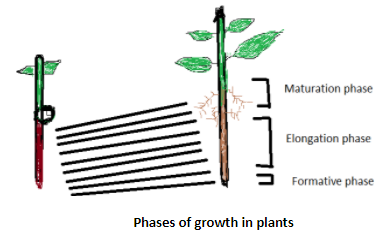
Explain different phases of growth in plants with the help of a diagram.
Answer
565.2k+ views
Hint: There are different stages of plant growth showing the continuous growth of the plant from seed germination to complete plant.
Complete answer:
Growth is the most fundamental characteristic of all living organisms. It is an irreversible and permanent metabolic process. Plants have a unique ability to continue throughout their lifecycle. This whole process is taken up by the specialized cells known as meristems.
There are three phases of growth in plants:
Meristematic or formative phase: It consists of continually dividing cells called meristematic cells at the root apex and the shooting apex. The cells contain broad nuclei and high protoplasm. The cell walls of these cells are primarily thin cellulose with abundant plasmodesmata connections.
Elongation phase: The cells present after meristematic cells lead to the elongation phase. These cells elongate because of the presence of in the cell and hence the zone is known as zone of elongation. The cell enlargement and new cell wall formation occurs in the cells found in the elongation phase. Modifications like larger vacuoles occur in the cells in this phase.
Maturation phase: The next cells seen after the elongation zone are in the maturation phase and they attain the huge size. They do not divide until they reach the maturation phase. The zone of maturation contains the mass differentiation phase where cells differentiate so that special functions in the plants take place.

After knowing all the phases of cell growth we can conclude that cell division, cell enlargement and cell differentiation are the different processes that occur in these three phases. The first two leads to an increase in plant size whereas the third phase results in bringing maturity to the cells.
Note: Various plant tissues are developed due to the occurrence of the three processes these are differentiation (when the cells stopped dividing and are beginning to mature and perform special function), Dedifferentiation (when the differentiated cells lost their ability to divide and can re again divide) and redifferentiation (when differentiated cells divide and once again produce cells that no longer divide but mature to perform special functions).
Complete answer:
Growth is the most fundamental characteristic of all living organisms. It is an irreversible and permanent metabolic process. Plants have a unique ability to continue throughout their lifecycle. This whole process is taken up by the specialized cells known as meristems.
There are three phases of growth in plants:
Meristematic or formative phase: It consists of continually dividing cells called meristematic cells at the root apex and the shooting apex. The cells contain broad nuclei and high protoplasm. The cell walls of these cells are primarily thin cellulose with abundant plasmodesmata connections.
Elongation phase: The cells present after meristematic cells lead to the elongation phase. These cells elongate because of the presence of in the cell and hence the zone is known as zone of elongation. The cell enlargement and new cell wall formation occurs in the cells found in the elongation phase. Modifications like larger vacuoles occur in the cells in this phase.
Maturation phase: The next cells seen after the elongation zone are in the maturation phase and they attain the huge size. They do not divide until they reach the maturation phase. The zone of maturation contains the mass differentiation phase where cells differentiate so that special functions in the plants take place.

After knowing all the phases of cell growth we can conclude that cell division, cell enlargement and cell differentiation are the different processes that occur in these three phases. The first two leads to an increase in plant size whereas the third phase results in bringing maturity to the cells.
Note: Various plant tissues are developed due to the occurrence of the three processes these are differentiation (when the cells stopped dividing and are beginning to mature and perform special function), Dedifferentiation (when the differentiated cells lost their ability to divide and can re again divide) and redifferentiation (when differentiated cells divide and once again produce cells that no longer divide but mature to perform special functions).
Recently Updated Pages
Master Class 11 Computer Science: Engaging Questions & Answers for Success

Master Class 11 Business Studies: Engaging Questions & Answers for Success

Master Class 11 Economics: Engaging Questions & Answers for Success

Master Class 11 English: Engaging Questions & Answers for Success

Master Class 11 Maths: Engaging Questions & Answers for Success

Master Class 11 Biology: Engaging Questions & Answers for Success

Trending doubts
One Metric ton is equal to kg A 10000 B 1000 C 100 class 11 physics CBSE

There are 720 permutations of the digits 1 2 3 4 5 class 11 maths CBSE

Discuss the various forms of bacteria class 11 biology CBSE

Draw a diagram of a plant cell and label at least eight class 11 biology CBSE

State the laws of reflection of light

10 examples of friction in our daily life




